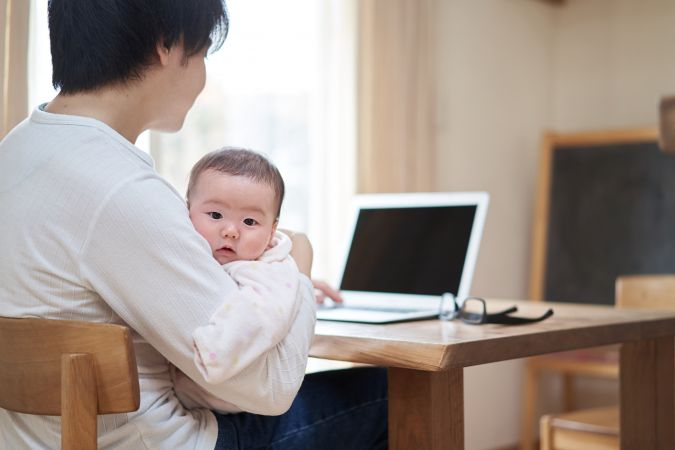
January 21, 2025
Is Japan’s Cultural Aversion to Public Noise Suppressing Its Birth Rate?
Is Japan’s silence pushing families away?
By Xiaochen Su
A father pushed a baby stroller into the half-empty carriage of a Tokyo subway train. As soon as he sat down, loud cries of his young son emerged from the stroller. Rushing to quiet the child, he pulled a stuffed animal from his bag and breathed a sigh of relief when the child let out a loud laugh at the sight of his fluffy friend.
But the father’s relief was quickly interrupted when he heard a loud “shush” from the woman sitting opposite him.
“Sorry, excuse me,” the man responded apologetically.
“This is not a kindergarten,” the woman announced, throwing a stern glare before looking back at her smartphone.
The “virtue” of public silence in Japan
When a friend told me this story, I was reminded how silence can be so thoroughly normalized in Japan. Even casual banter in public spaces can be frowned upon and criticized as socially deviant. Those who partake in such behaviors are considered social irritants, most succinctly summed up through the concept of meiwaku (“bothersomeness”) in Japanese.
Perhaps nowhere is this more evident than among the country’s metro systems. Journeys in subway trains, whether up in Sapporo or down in Fukuoka, often filled me with concerns about speaking too loudly. Surrounded by quietly snoozing salarymen, headphone-toting teenagers engrossed in short videos, and the occasional bibliophile, my friends and I often felt guilty continuing our conversations after boarding a train. And indeed, multiple times across multiple cities, fellow passengers quietly nudged us to keep our voices down.
After decades of this silent reality, the Japanese public has come to view “being quiet” as a sign of cultured mannerisms and etiquette expected of the educated. In 2022, The Atlantic claimed that the belief among the urban rich that silence is socially “proper” meant gentrification had quieted middle-income neighborhoods in America. Almost by the same logic, being publicly loud in Japan has become associated with a lack of civility, which should be a common identity of the Japanese nation. And that identity is, as a 2022 Japan International Labor Foundation survey indicated, one in which the majority continues to pride themselves as being a part of the “100 million middle-class society”.
A virtue taken too far?
Unfortunately, while the average baby knows no virtue of silence, the Japanese public increasingly wants families to conform to the same social norm. The criticism of a baby’s vocal expression symbolizes how an obsession with noise control can fundamentally change social relationships beyond noise itself.
As vocal children become the quintessential meiwaku, those, like the father with the young son, are forced to apologize for the uncontrollable noise of their babies.
Such apologies have reinforced the social marginalization of those with children. A 2023 article in the major French newspaper Le Figaro observed that Japan’s low birthrate is not only a result of financial factors, but social ones, including restaurants that openly ban customers under the age of 12 and protests by residents that specifically target the construction of kindergartens in their neighborhoods. Even Japan Airlines details how it restricts where children can sit on a flight by marking only some seats as available to infants. These actions can be interpreted as a visible reflection of how the general public portrays children in public areas as undesirable.
The collective ostracization of children as socially deviant only serves to exacerbate the already severe issue of low birthrates in Japan. Data from the UN Population Fund shows that the country has one of the lowest fertility rates in the world. As German broadcaster DW argued in 2022, the Japanese government’s efforts to reverse the trend through monetary incentives have not been effective.
Can something be done about the “anti-baby” attitude in Japan?
As aversion to public noise pushes people to have fewer babies, it will be increasingly urgent to frame this cultural idiosyncrasy as an economic liability. Data from the Bank of Japan shows that approximately 60% of the Japanese economy is private consumption. The country’s future economic health depends increasingly on the local consumer base not shrinking rapidly in the coming years.
The general public will not voluntarily abandon a cherished social norm. Instead, it will be up to the Japanese government to look at how it can reverse cultural aversions to children among citizens. In particular, a greater effort at policy reforms will be needed to create a widespread mindset that supports and approves the presence of babies—and their inevitable noises—in public spaces. Transparent regulations, such as on what types of businesses in what areas can restrict access to children at what times, will provide the legal foundation for new social expectations.
The solution to the low birth rate in Japan?
The government could also enact financial measures to protect young families from outright ostracization. Rather than just funding nurseries and kindergartens, the government could invest in more inclusive public facilities, from buses specifically catering to families with infants to baby-friendly restaurants. Such initiatives may help a new form of “ageism,” like the loud “shush” on the train, a new taboo. This is a good first step to shift social attitudes toward babies from concern and opposition to tolerance and then acceptance.
You might also be interested in, “Why Tokyo Works?”







